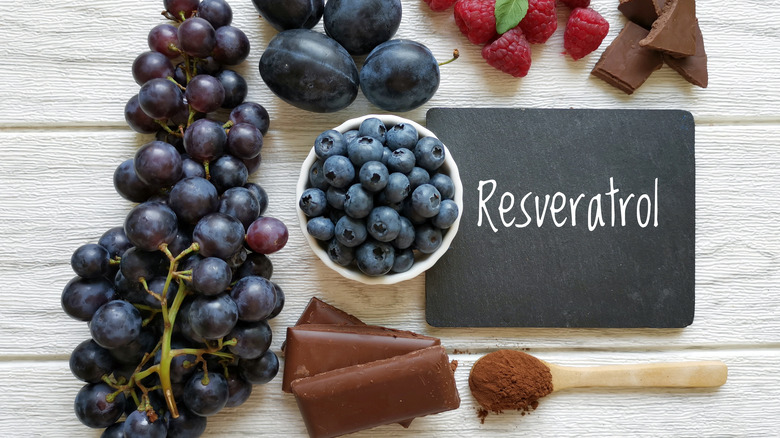What Is Resveratrol And Why Should You Take It?
Chances are, you have heard about the incredible research that shows wine is actually a powerful superfood with health-enhancing properties. This 2018 review published in the journal Diseases found that moderate red wine consumption, in conjunction with a Mediterranean diet, may help prevent disease and promote longevity. Not to ruin your buzz, but it's not the alcohol in wine that is responsible for these medicinal qualities. Wine contains a powerful antioxidant called resveratrol, which is also found in foods like peanuts, berries, and dark chocolate, but is very highly concentrated in the skins and seeds of grapes (via Oregon State University).
According to the Cleveland Clinic, resveratrol is an antioxidant with many different medicinal qualities, and it may be worth supplementing your diet with it. This does not necessarily mean drinking a bottle of wine every night, as grapes and grape juice are both also excellent sources of resveratrol. While many health food stores and online retailers also stock resveratrol capsules, it may be better to get yours from a natural source. Nutritional supplements are not regulated by the FDA, and there are some concerns about whether resveratrol is as easy to absorb when isolated. There is also some concern about the potential to consume too much and suffer side effects like nausea, diarrhea, and vomiting, though they are less likely to occur when ingested through natural sources (via Cleveland Clinic).
What are the health benefits of resveratrol?
Resveratrol is a well-studied antioxidant out there; after all, that's why you have heard about all those amazing wine studies. One of the most incredible beneficial properties of resveratrol is its protective effect on the brain. According to a 2019 study published in the Archives of Medical Science, resveratrol has been suggested to improve cerebral blood flow and correspondingly may improve cognitive test results and performance. A 2015 study published in the European Journal of Pharmacology showed that resveratrol reduced inflammation in the brain and the depressive-like behavior that was associated with this condition in mice.
But your brain is not the only organ reaping benefits from resveratrol. Since cardiovascular disease is the leading cause of death globally (via WHO), resveratrol may be one of the most important antioxidants we should be including in our diet for better heart health. In fact, a 2019 study published in the International Journal of Molecular Sciences found that resveratrol is a "novel" therapeutic agent against both cardiovascular disease and heart failure. Moreover, a 2018 study published in the Journal of the American Osteopathic Association found that resveratrol is a potential adjunctive treatment for obesity, diabetes, and cancer. With all of this going for it, resveratrol, whether consumed in wine or in fruit and juices, is a substance worth toasting to.


